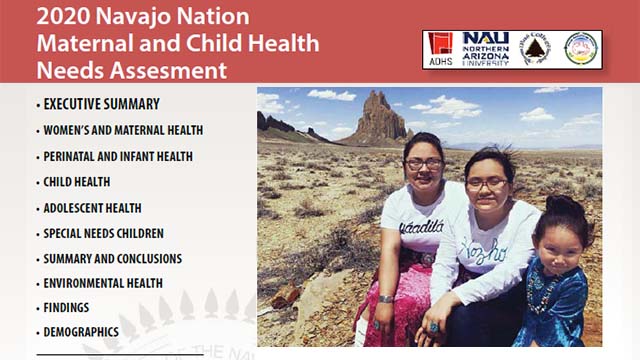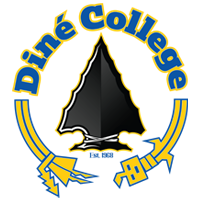
FOR IMMEDIATE RELEASE
Oct. 7, 2020
Students Play Key Role in Navajo Maternal Health Report
TSAILE, Ariz.— The Navajo Epidemiology Center and Diné College jointly announced the publication of their report titled, “2020 Navajo Nation Maternal and Child Health Needs Assessment.”
“We are pleased to have collaborated with the Navajo Epidemiology Center to bring you this report to you,” Diné College President Charles Monty Roessel said.
“The report was developed collaboratively between the Navajo Native American Research Centers for Health Partnership (NNARCH), Diné College, Northern Arizona University and the Navajo Department of Health.
Funding was provided by NNARCH and the Arizona Department of Health Services (ADHS). NNARCH is funded by the National Institutes of Health to increase the numbers of Navajo health professionals with an educational pathway in public health from high school to graduate school. The partnership has also provided support for the Navajo Nation Hantavirus Conference and the Navajo Research Conference in recent years, coordinated by Diné College, the Navajo Department of Health and the Navajo Epidemiology Center.
“Our goal is to improve the health and well-being of mothers and children here on the Nation,” Amber-Rose Waters, project coordinator with Diné College’s public health program, said. “We listened to the voices of parents, grandparents, teens, elders and others in order to make this report as complete and useful as possible.”
The report incorporates Navajo traditional understandings of health, including the Są’áh Naagháí Bik’eh Hózhóó framework which means to live a long and healthy life while maintaining balance and harmony. The use of this framework connects kinship, the environment and personal and community health. The view incorporates an understanding of health that includes not only physical aspects, but emotional and spiritual aspects, as well as the connection to the land in which we live.
The report notes several improvements in health, including declines in substance use, improvements in immunizations of children and pre-natal uptake of vitamins.
“This is good news. We can also see areas that need improvement,” Del Yazzie of the Navajo Epidemiology Center said. “There is a need for more support for breastfeeding mothers, better access to services for kids with special needs, and better prenatal, infant, child and adolescent care. The data from this study will support our efforts to make those improvements.”
“The Navajo Epidemiology Center looked to our public health program here at Diné College to locate and organize existing data and develop the report,” Dr. Mark Bauer of Diné College said. “As one of the few colleges in the U.S. offering a four-year bachelor’s degree program in public health, we were in a strong position to assist in this effort. Our senior level students contributed a wealth of information to this report, and we thank them for that.”
The report is available on the website of the Navajo Nation Department of Health:
2020 Navajo Nation Maternal and Child Health Needs Assessment Report
CONTACT US
Marie R. Etsitty Nez
Vice President of External Affairs
marienez@dinecollege.edu
928-724-6985
George Joe, M.A., M.Ed, Director Of Marketing and Communications
grjoe@dinecollege.edu
928-724-6695
Bernie Dotson, Public Relations Officer
bdotson@dinecollege.edu
928-724-6697
Scott Tom, Graphic Design and Digital Media Specialist
shtom@dinecollege.edu
928-724-6698
Jazzmine D. Martinez, Marketing Assistant
jdmartinez@dinecollege.edu
928-724-6694
